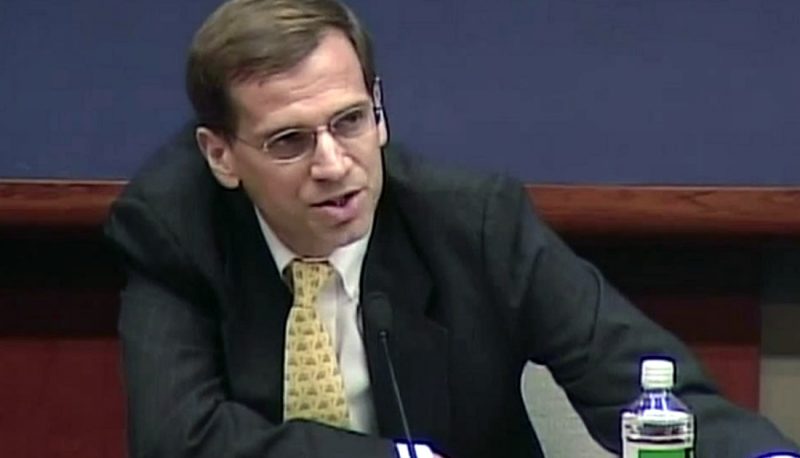“Confirmed Judges, Confirmed Fears” is a blog series documenting the harmful impact of President Trump’s judges on Americans’ rights and liberties. Cases in the series can be found by issue and by judge at this link.
Trump DC Circuit judge Greg Katsas cast the deciding vote in a 2-1 ruling that invalidated a Food and Drug Administration (FDA) regulation banning a medical device only for uses that were determined to be dangerous. The majority held that the FDA must either ban a device for all uses or not at all in its July 2021 decision in Judge Rotenberg Educational Center v United States Food and Drug Administration.
Until the FDA took action, the Rotenberg Educational Center was “the only facility in the country” that still used “electric shock therapy” as part of its treatment of patients with serious mental disabilities who exhibit “severe self-injurious or aggressive behavior.” After a “years-long examination,” the FDA adopted a regulation that banned electrical stimulation devices for such use, concluding that this use has severe “psychological and physical risks” that are “substantial and unreasonable” and that there was only “weak” evidence that such treatment was effective. The FDA did not extend the ban to other uses of such devices, such as to help treat smoking addiction in which the patients themselves control the device, and specifically found that Congress had given it the authority to enact such a partial ban.
The Center and others challenged the FDA regulation directly in the DC Circuit. Trump judge Katsas provided the deciding vote to invalidate the ban, in a decision claiming that the FDA does not have the authority to prohibit a medical device for some but not all uses. The majority acknowledged that the FDA has the authority to ban medical devices that it determines pose an “unreasonable and substantial risk of illness or injury.” According to the majority and as the petitioners had argued, however, a partial ban violates a section of the FDA law that prohibits the “practice of medicine” by the FDA. That section states that the FDA cannot “limit or interfere” with the authority of a health care practitioner to “administer any legally marketed device” to a patient. In essence, the majority maintained, if the FDA allows electrical stimulation devices to be used for some purposes such as treating addiction to smoking, it cannot prevent doctors from using them for other purposes like treating people with mental disabilities. In addition, the majority stated, a partial ban violates “federalism concerns” by regulating the practice of medicine, a traditional area of state responsibility, by limiting “what devices a practitioner should administer” for “what condition.”
Chief Judge Sri Srinivasan firmly dissented. The FDA had rejected the petitioners’ interpretation of the provision that stated that practitioners can use a “legally marketed device” for another purpose, Srinivasan noted. He explained that, as the FDA stated, this language means that such a device can be used for a reason that is not being specifically allowed by the FDA but does not contradict the agency’s authority to prohibit the use of a device for specified purposes. While the petitioner’s construction of the law is a “permissible one,” Srinivasan continued, the FDA’s interpretation is “permissible as well,” and the agency is legally entitled to deference in interpreting the law. Since even the majority conceded that the FDA could completely ban a device that practitioners might want to use, Srinivasan continued, there is no proper basis for the claim that “allowing the agency to fashion a less intrusive ban” than a complete prohibition “would give rise to a more significant federalism-based concern.”
Judge Srinivasan explained the dangers of the majority’s “all-or-nothing” interpretation of the law, which he suggested Congress did not intend. The result of the majority’s ruling, he wrote, is to “force” the FDA to either “abolish a highly beneficial use” of a device “so it can stamp out a highly risky one,” or to “stomach the highly risky use so it can preserve the highly beneficial one.” Yet that is precisely the result of the decision made possible by Trump judge Katsas’ deciding vote.
Unless the full DC Circuit reconsiders this ruling, the result will be to harm the ability of the FDA to fulfill its primary mission, as the Supreme Court put it, of “protect[ing] consumers from dangerous products.” Because of the particular importance of the DC Circuit in considering federal agency authority, there could well be additional cases where Trump DC Circuit judges seek to hobble agencies like the FDA. The Senate has already confirmed one Biden nominee to the DC Circuit, and it is crucial to our fight for our courts that the President and the Senate continue to nominate and confirm more judges to the court.

